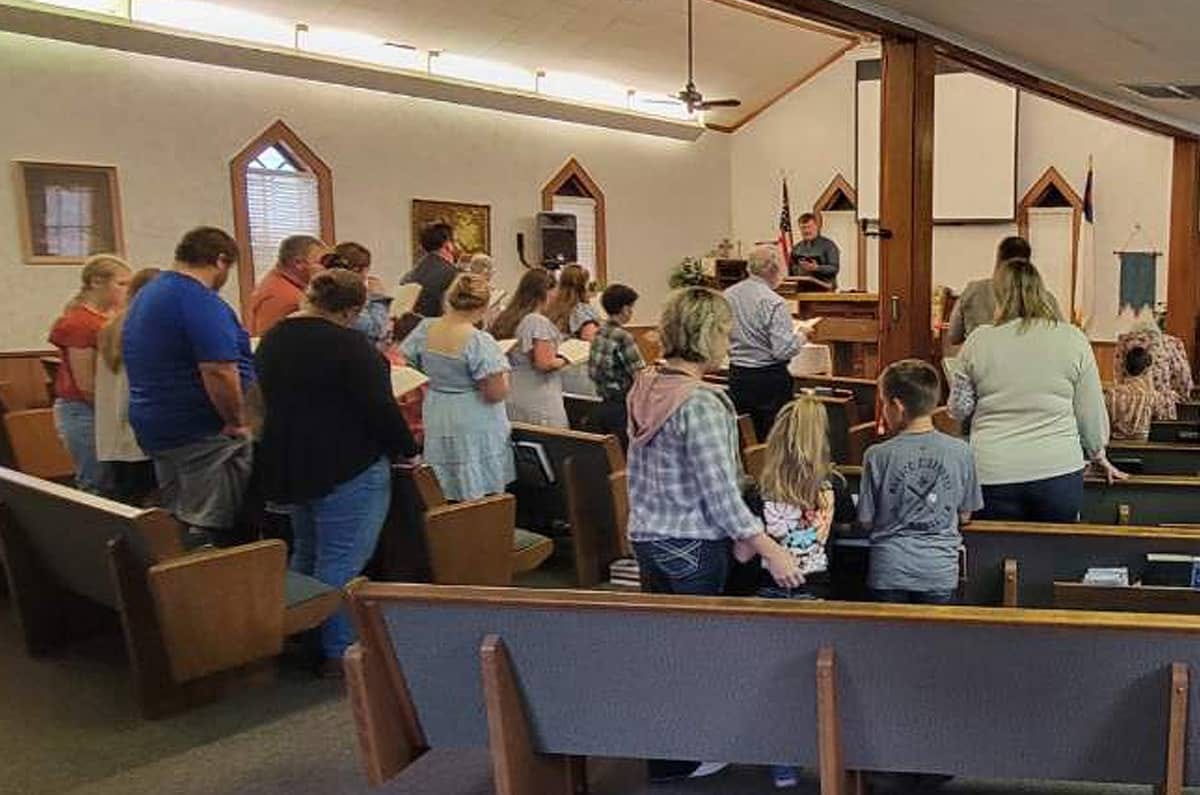
In our digital age, where convenience is king and consumerism pervades even the most sacred spaces, the concept of “online church” and the rise of “seeker churches” threatens to completely redefine what the church is for a generation of believers.
“Online church” and “seeker church” both offer an alluring sense of connection and spirituality, but in ways that grotesquely make a caricature of God, worship, and the bride of Christ. Defenders would say this is “contextualization.” No, not even close. These aren’t harmless adaptations to cultural trends, these things undermine foundational truths about the church as the ongoing embodiment of our Lord.
Online church is as genuine as gas station sushi. Perhaps that’s an insult to gas station sushi.
The Church is Embodied, Not Abstract
At its core, Christianity is an embodied faith. The incarnation of Jesus Christ—the eternal God taking on flesh and dwelling among us—is at the very heart of the gospel. Jesus did not save us from a distance. He lived, breathed, suffered, died, and rose again in a real human body. Similarly, the church, as His body, is not meant to be a disembodied abstraction but a tangible, local gathering of believers who worship together, serve one another, and live out the gospel in their communities.
Online church, however, dismembers the body of Christ. It takes the body of Christ and cuts it up into pieces. It reduces the worshiping church to an abstraction. The depths of how much this has distorted people’s thinking, I posted a sermon clip on X, saying that online church is not a real church. One man commented, “You can take communion at home, worship at home, and watch the service on a Sunday morning. It’s great.” Another commenter said, “What does it matter if they show up to a building?”
For many Christians, these are sensible takes. But they are sensible only because they’ve already bought into a gnostic understanding of Christianity that disregards the body. Just as every human being is an “embodied soul,” so also the church is and must be an embodied reality true Christianity is not only for the spirit, but for spirit and body.
Paul said, “Now you are the body of Christ and individually members of it” (1 Cor 12:27). That one sentence packs a powerful punch. The more you disregard the embodied nature of the church, the more you end up with bizarre or even demonic perversions.
Check this out. I wish it were a joke, but alas, it’s not. A megachurch pastor has created an AI model of himself, his voice and personality, and is selling $49 subscriptions to this personalized pastor service. In a viral video clip, the pastor, who has a deep southern drawl, asks the AI version of himself on his phone for prayer. A moment later, the exact same voice and personality starts speaking through his phone and begins praying:
I can’t tell you how bad I hate this. It should be obvious that it’s not an actual prayer. Prayer is not a magical incantation spoken over a hurting individual to make them feel better. Prayer is the redeemed saint’s unique privilege of communing with and petitioning the Lord.
God is not a chat-bot. Prayer is not an app. Worship is not a YouTube video. Communion is not a can of Pepsi and slice of bread. These things cheapen worship by turning it into a consumer product.
Let me put it this way: if it’s got a “pause” button, it’s not a church.
Similarly, church cannot be digitally abstracted any more than a marriage can. It requires living, flesh and blood human beings. Technology may be able to supplement a church’s ministry—through livestreamed sermons for shut-ins or Bible study tools—but it cannot replace the local, physical gathering of believers. Watching a sermon online is no more “church” than watching a cooking show is a family dinner.
The notion of online church feeds into a consumeristic mindset where people engage with worship on their own terms: when they feel like it, how they feel like it, and with no obligations to others. It offers a false sense of participation while isolating believers from the messiness, accountability, and blessings of real community. The New Testament is unequivocal: the church is a gathering of believers who know, love, and serve one another in tangible ways.
Church Membership in a Physical Context
Biblical church membership is deeply relational. The commands to “love one another,” “bear one another’s burdens,” and “spur one another on to love and good deeds” are all given in the context of face-to-face relationships within a local church body. These commands assume physical proximity and personal interaction. I don’t have to bear anyone’s burdens on Twitter, I just hit the block button if they get annoying.
But when the church gathers, the Spirit of God uniquely and profoundly works among His people by his transforming presence. Jesus Himself promised, “Where two or three are gathered in my name, there I am among them” (Matthew 18:20). The gathered church is a visible manifestation of Christ’s body, something that cannot be replicated through a screen.
The idea of online church also fails to account for the sacramental nature of the church’s worship. Baptism and the Lord’s Supper, two ordinances instituted by Christ, require physical presence. You cannot baptize yourself or take communion in isolation while watching a livestream. These practices are communal by design, reinforcing the reality that we are members of one another, not isolated individuals practicing a private spirituality.
The Consumerist Mindset
For these reasons, “online church” and “seeker church” are different manifestations of the same error. Both are marketing strategies to “sell” spiritual benefits to religious consumers. God is a product. The gospel is the product being peddled, and as they see it, it’s a great “deal” because the gospel is free.
Thus, church is about pleasing the consumer base. Those who attend these churches are customers, who are sometimes fickle, but the customer is always right and their demands must be met. “Seekers” are an opportunity market. Since devoted Christians are the base market, seekers are the growth market that can be reached with the same tools used to sell any product.
This isn’t conjecture, I know this from personal experience with pastors and ministry leaders. One giga-church I know of was founded by a team of Christian marketing executives from Proctor and Gamble who started a seeker church and hired a dynamic preacher to lead it. It’s become one of the largest churches in the country. One of their “campuses” is an online campus that has an online campus pastor. (I’m surprised they haven’t replaced him yet with an AI chat-bot pastor.)
At the heart of these things is a misunderstanding of the church’s purpose. The church is not primarily a place for seekers; it is a gathering of saints. The New Testament consistently portrays the church as a community of believers who come together for worship, discipleship, fellowship, and mission. While evangelism is certainly a key function of the church, it is not its primary purpose. The church exists to glorify God and edify the saints.
By orienting everything around seekers, these churches risk turning worship into a performance and discipleship becomes an afterthought. Sermon themes that might offend a seeker must be avoided. They are often stripped of challenging content and deep theological truths in favor of self-help messages and pop culture references. How many more “Jesus at the movies” sermon series can people endure before this exhausted idea runs out of gas?
It’s funny in a way. Seeker churches used to say edgy things like “we’re not your grandma’s church!” But they’ve been around for so long that the founders of the movement are now grandparents themselves while their grandchildren, starving for stability, history, and tradition, are abandoning megachurches in favor of historic confessional Christianity.
That’s a good thing, except that some of them are now joining the church of Rome, not because they find their doctrines compelling, but because the high-church aesthetics of Catholicism feels more authentic than the gimmicky seeker church they’ve left.
Your “grandmas” church is now the lame seeker church. The “kids these days” are now seeking tradition and doctrine. This is an opportunity for confessional churches to return to worship services that are focused on exalting Christ rather than pleather spectacles. Mega-churchianity may attract large crowds but struggle to produce mature, committed disciples.
These trends weaken the church’s witness in the world. A church that caters to consumers or abstracts itself from physical community loses its ability to model the countercultural, sacrificial love that Christ calls His followers to embody. Jesus said, “By this all people will know that you are my disciples, if you have love for one another” (John 13:35). Love is not an abstraction. Love is a real duty to real people that we choose to love despite their flaws. This kind of love is impossible to demonstrate in isolation or in a context where relationships are shallow and transactional.
Moreover, when churches prioritize entertainment and accessibility over truth and holiness, they fail to offer the world what it truly needs: the transformative power of the gospel. The church’s distinctiveness is its greatest strength. When it tries to mimic the world to win the world, it loses its power and credibility.
Recovering the Biblical Vision of the Church
To combat these distortions, we must recover a biblical vision of the church as both a divine and human entity. The church is a supernatural body, indwelled by the Spirit of God and called to reflect His glory. At the same time, it is a deeply human community, made up of imperfect people who are learning to love and serve one another in tangible ways.
This vision requires a renewed commitment to local church membership. Membership is not about adding your name to a list or attending services sporadically; it is a covenantal relationship where believers commit to one another in love and accountability. It is through this kind of commitment that the church can function as the body of Christ, with each member using their gifts to serve one another in love.
In a real church, preachers may be boring. People may sing off key. The heater may be broken and you worship in the cold. We’ve lost our appreciation for the fact that “God chose what is foolish in the world to shame the wise; God chose what is weak in the world to shame the strong; God chose what is low and despised in the world, even things that are not, to bring to nothing things that are, so that no human being might boast in the presence of God” (1 Cor 1:27-29). Some of the most godly people I know were saved, discipled, and even called to the ministry in churches that would likely be rated “2 out of 5” stars on Yelp!.
These things require the sort of patience, grace, and sanctification that are baked into the Christian life. It requires we embrace the challenges of real community. The church is not perfect because its members are not perfect. Hurt and misunderstandings will happen, but the solution is not to withdraw or create an abstract version of church that avoids relational difficulty. The solution is to forgive, reconcile, and grow together in grace.
Conclusion
The church is not a consumer product. It is the body of Christ. A living, breathing manifestation of His presence in the world. It is a family, a fellowship, and a mission. To settle for online church or seeker church is to lose the essence of what church is.
The antidote is simple. Reject the consumer mindset and commit to the most faithful local church you can find. If there truly is no option within reasonable distance, consider moving to an area where you can find a solid church. When you do, show up, commit to the people, serve them, forgive them, love them, and embrace both the blessings and challenges of real community. This not only honors Christ, but opens up the fullness of blessings he intended church to be. Real, embodied, local church life is not always easy, but it is profoundly good—and it is through this imperfect yet beautiful body that God is making His wisdom known to the world.
Postscript
Previous generations understood the ordinariness of church in hilarious and ingenious ways.



















Thanks Pastor Clary for raising this timely issue. I also appreciated your supporting article on contextualization too.
I agree, of paramount importance to face to face church life is the “one another” ministering.
“Serve one another, love one another, speak to one another, pray for one another, exhort one another”.
I believe the main reason the transition from church building attendance to virtual was so instantly, and naturally accepted by a large portion of church goers the last few years was the lack of “one another” caring in the church building setting.
Those who choose to be a follower of Jesus demand requirements(what Jesus action will you do Monday through Saturday that demonstrates you are a believer?), but the emphasis of most churches is grace.
Sermons are limited to a short list of texts(not those that would make people feel uncomfortable/called on, or question their salvation).
How many times have you heard that everyone of us should visit our neighbors/co-parishioners when they’re in the hospital(Matthew 25:36)?
Most members believe that is the job of their Pastor.
We live in a day where people interact with others less than ever before.
But Jesus challenges us, “the church should be in the world, but not of it”(John 17:14,18).
Exceptional post. When I read the first part, I was going to add that online stuff can be a useful supplement, but you even got to that as well. Thank you for your well thought out post.